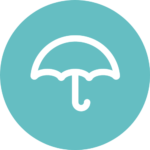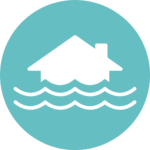Homeowners insurance, also known as home insurance, is a type of insurance that provides coverage for your home and personal belongings in case of damage or loss. Home insurance policies generally cover four types of incidents that may occur on the insured property: interior damage, exterior damage, loss or damage of personal belongings, and injury that occurs while on the property. If a claim is filed for any of these incidents, the homeowner pays a deductible, and the insurance company covers the rest of the claim.
Definitions
Deductible: The deductible is the amount subtracted, or deducted, from what the insurance pays toward the claim. For example, if the policy deductible is $2,000 and you have a loss under your policy that costs $10,000, you pay $2,000 and the insurance company will take care of the remaining $8,000. The higher the deductible, the lower the monthly or annual premium on the homeowners insurance policy. Deductibles are how risk is shared between the policyholder (or homeowner) and the insurer.
Liability Limit: Each homeowners insurance policy also has a liability limit, which determines the coverage the insured has in case of an unexpected event. Standard limits are typically set at $100,000, but policyholders can choose a higher limit. If a claim is made, the liability limit specifies the percentage of the coverage amount that will go towards repairing or replacing the property structures, personal belongings, and costs associated with living elsewhere while the property is being worked on.
As Investopedia points out: "Homeowners insurance . . . isn't a luxury; it's a necessity." Most mortgage lenders require borrowers to have insurance coverage for the the full or fair value of the property (typically, the purchase price) and will not issue or refinance a mortgage without proof of coverage.
Here are the most common types of coverage that homeowners insurance typically includes:
1. Your Home
Sometimes referred to as ‘Dwelling Coverage’, this aspect of homeowners insurance covers the physical structure of your home. This includes:
- Foundation
- Floors, Walls, and Ceilings
- Roof
- Mechanicals (Plumbing, Electrical, etc.)
- Any other structural component of your home
THE INSURANCE COVERS THE COST OF REBUILDING YOUR HOME IF IT IS DAMAGED OR DESTROYED BY FIRES, HURRICANES, OR ANY OTHER TYPE OF DISASTER LISTED IN YOUR POLICY.
2. Your Personal Belongings
Homeowners insurance doesn’t just cover your home, it covers everything inside too - like furniture, clothes, and appliances.
More expensive possessions like electronics, jewelry, and artwork are typically covered up to a certain amount. If you own a lot of expensive items, you can increase your levels of coverage for those items.
Your possessions are insured against events like theft, fire, and other covered disasters.
3. Other Structures on Your Property
Many homeowners have additional structures on their property besides their main residence. These might include:
- A Garage
- A Guest House or Additional Dwelling Unit (ADU)
- A Shed or Outhouse
- Fences
MOST HOMEOWNERS INSURANCE POLICIES COVER THESE ITEMS – CHECK YOUR POLICY FOR SPECIFICS.
4. Liability For Injuries or Damages
Homeowners insurance also protects homeowners against liabilities for injuries or damages suffered by others on their property.
One example: a neighbor trips and falls on a broken step, and sues you for medical expenses and loss of earnings. Your homeowners insurance would cover all associated costs.
Homeowners are typically covered for $100k - $500k in liabilities, depending on the level of coverage in their policy. Experts suggest you have at least $300k in coverage.
5. Other Coverage

Additional Living Expenses
Most policies cover living expenses if you have to move out of your home temporarily due to a covered disaster. Your insurance will cover the cost of a hotel room or temporary rental accommodation.
Personal Umbrella Coverage
This adds additional liability coverage to your homeowners policy. High net worth individuals with a lot of assets, or people who own liability-increasing assets like swimming pools, are good candidates for personal umbrella coverage.


Flood & Earthquake Insurance
These are NOT covered by traditional homeowners insurance policies. If you live in an area where either of these is a threat, you will need to purchase additional insurance coverage.
It's important to note that every policy is different, and coverage can vary depending on your insurance provider, where you live, and the specifics of your policy. It's a good idea to review your policy regularly to ensure that you have the coverage you need.
A new house is a big purchase. It’s important to feel confident about your investment. If you have questions or concerns about buying a new home, give me a call! I’m always happy to offer advice and guidance for this exciting endeavor.



